Corporate Governance: Ghosn's Case, Nissan-Renault, and Global Impact
VerifiedAdded on 2022/11/14
|9
|2648
|84
Report
AI Summary
This report analyzes the complexities of corporate governance in a globalizing world, using the Carlos Ghosn case involving Nissan, Renault, and Mitsubishi as a central example. The report delves into the allegations of financial misconduct against Ghosn, his subsequent arrest, and the impact on the automobile industry, particularly in Japan. It explores the agency and stewardship theories to understand the issues of executive compensation, cross-holdings, and the roles of independent directors. The report highlights the weak corporate governance procedures within Nissan and the broader challenges faced by Japanese companies in maintaining good corporate governance practices. Furthermore, it contrasts the corporate governance approaches of Japan and Australia, emphasizing the importance of transparency, stakeholder engagement, and the protection of shareholder interests. The report concludes with recommendations for improving corporate governance systems to ensure long-term organizational success and value creation.
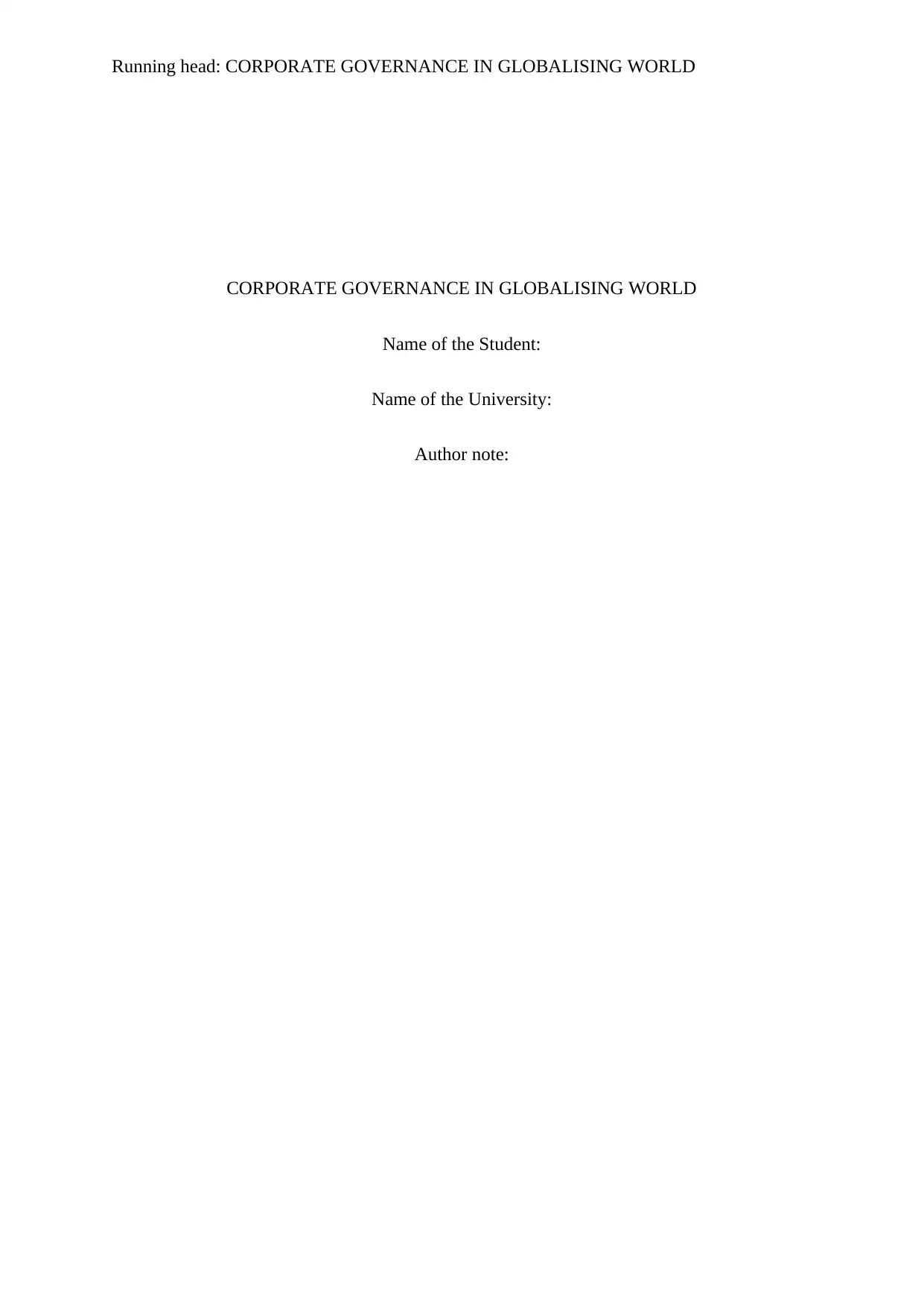
Running head: CORPORATE GOVERNANCE IN GLOBALISING WORLD
CORPORATE GOVERNANCE IN GLOBALISING WORLD
Name of the Student:
Name of the University:
Author note:
CORPORATE GOVERNANCE IN GLOBALISING WORLD
Name of the Student:
Name of the University:
Author note:
Paraphrase This Document
Need a fresh take? Get an instant paraphrase of this document with our AI Paraphraser
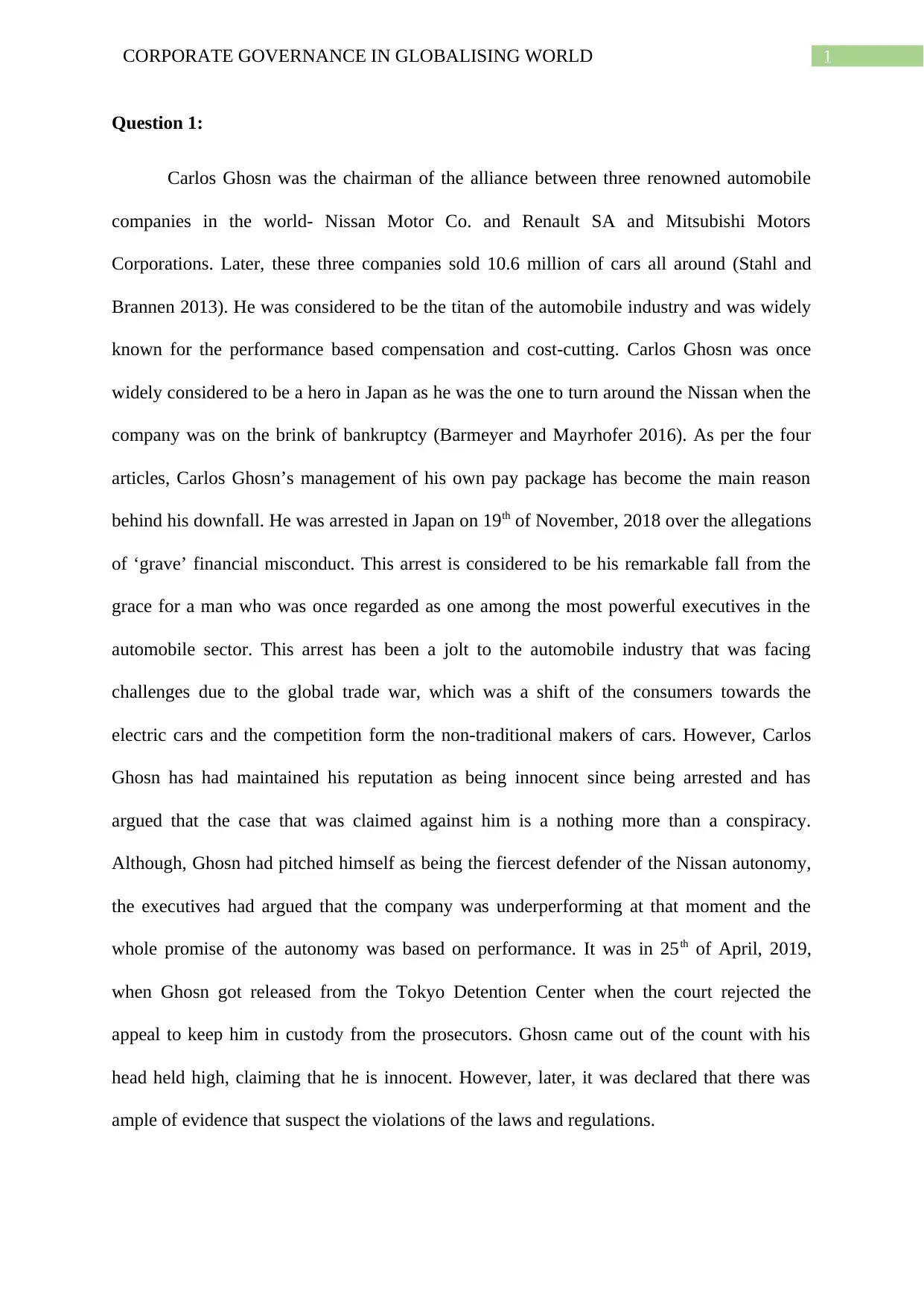
1CORPORATE GOVERNANCE IN GLOBALISING WORLD
Question 1:
Carlos Ghosn was the chairman of the alliance between three renowned automobile
companies in the world- Nissan Motor Co. and Renault SA and Mitsubishi Motors
Corporations. Later, these three companies sold 10.6 million of cars all around (Stahl and
Brannen 2013). He was considered to be the titan of the automobile industry and was widely
known for the performance based compensation and cost-cutting. Carlos Ghosn was once
widely considered to be a hero in Japan as he was the one to turn around the Nissan when the
company was on the brink of bankruptcy (Barmeyer and Mayrhofer 2016). As per the four
articles, Carlos Ghosn’s management of his own pay package has become the main reason
behind his downfall. He was arrested in Japan on 19th of November, 2018 over the allegations
of ‘grave’ financial misconduct. This arrest is considered to be his remarkable fall from the
grace for a man who was once regarded as one among the most powerful executives in the
automobile sector. This arrest has been a jolt to the automobile industry that was facing
challenges due to the global trade war, which was a shift of the consumers towards the
electric cars and the competition form the non-traditional makers of cars. However, Carlos
Ghosn has had maintained his reputation as being innocent since being arrested and has
argued that the case that was claimed against him is a nothing more than a conspiracy.
Although, Ghosn had pitched himself as being the fiercest defender of the Nissan autonomy,
the executives had argued that the company was underperforming at that moment and the
whole promise of the autonomy was based on performance. It was in 25th of April, 2019,
when Ghosn got released from the Tokyo Detention Center when the court rejected the
appeal to keep him in custody from the prosecutors. Ghosn came out of the count with his
head held high, claiming that he is innocent. However, later, it was declared that there was
ample of evidence that suspect the violations of the laws and regulations.
Question 1:
Carlos Ghosn was the chairman of the alliance between three renowned automobile
companies in the world- Nissan Motor Co. and Renault SA and Mitsubishi Motors
Corporations. Later, these three companies sold 10.6 million of cars all around (Stahl and
Brannen 2013). He was considered to be the titan of the automobile industry and was widely
known for the performance based compensation and cost-cutting. Carlos Ghosn was once
widely considered to be a hero in Japan as he was the one to turn around the Nissan when the
company was on the brink of bankruptcy (Barmeyer and Mayrhofer 2016). As per the four
articles, Carlos Ghosn’s management of his own pay package has become the main reason
behind his downfall. He was arrested in Japan on 19th of November, 2018 over the allegations
of ‘grave’ financial misconduct. This arrest is considered to be his remarkable fall from the
grace for a man who was once regarded as one among the most powerful executives in the
automobile sector. This arrest has been a jolt to the automobile industry that was facing
challenges due to the global trade war, which was a shift of the consumers towards the
electric cars and the competition form the non-traditional makers of cars. However, Carlos
Ghosn has had maintained his reputation as being innocent since being arrested and has
argued that the case that was claimed against him is a nothing more than a conspiracy.
Although, Ghosn had pitched himself as being the fiercest defender of the Nissan autonomy,
the executives had argued that the company was underperforming at that moment and the
whole promise of the autonomy was based on performance. It was in 25th of April, 2019,
when Ghosn got released from the Tokyo Detention Center when the court rejected the
appeal to keep him in custody from the prosecutors. Ghosn came out of the count with his
head held high, claiming that he is innocent. However, later, it was declared that there was
ample of evidence that suspect the violations of the laws and regulations.
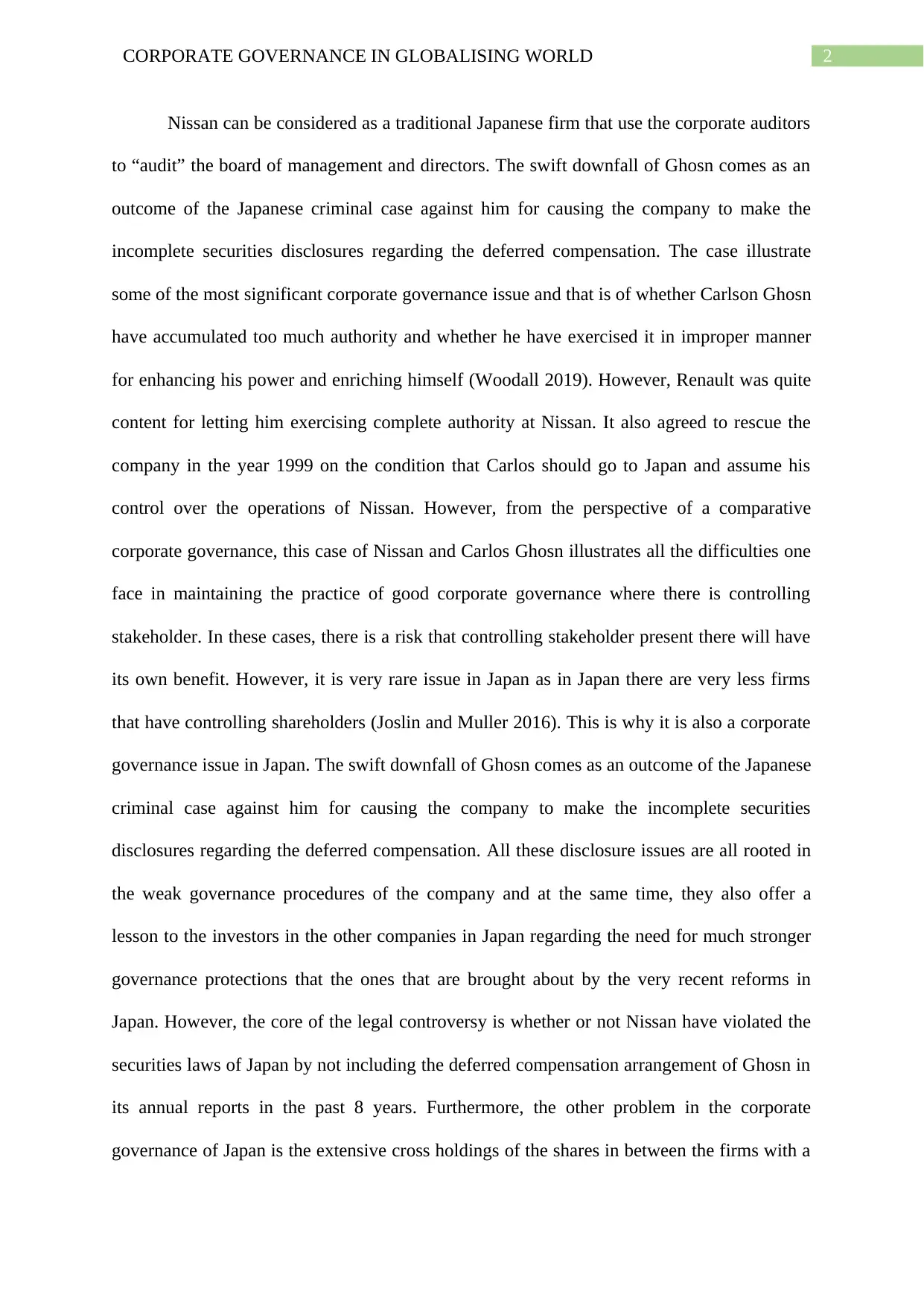
2CORPORATE GOVERNANCE IN GLOBALISING WORLD
Nissan can be considered as a traditional Japanese firm that use the corporate auditors
to “audit” the board of management and directors. The swift downfall of Ghosn comes as an
outcome of the Japanese criminal case against him for causing the company to make the
incomplete securities disclosures regarding the deferred compensation. The case illustrate
some of the most significant corporate governance issue and that is of whether Carlson Ghosn
have accumulated too much authority and whether he have exercised it in improper manner
for enhancing his power and enriching himself (Woodall 2019). However, Renault was quite
content for letting him exercising complete authority at Nissan. It also agreed to rescue the
company in the year 1999 on the condition that Carlos should go to Japan and assume his
control over the operations of Nissan. However, from the perspective of a comparative
corporate governance, this case of Nissan and Carlos Ghosn illustrates all the difficulties one
face in maintaining the practice of good corporate governance where there is controlling
stakeholder. In these cases, there is a risk that controlling stakeholder present there will have
its own benefit. However, it is very rare issue in Japan as in Japan there are very less firms
that have controlling shareholders (Joslin and Muller 2016). This is why it is also a corporate
governance issue in Japan. The swift downfall of Ghosn comes as an outcome of the Japanese
criminal case against him for causing the company to make the incomplete securities
disclosures regarding the deferred compensation. All these disclosure issues are all rooted in
the weak governance procedures of the company and at the same time, they also offer a
lesson to the investors in the other companies in Japan regarding the need for much stronger
governance protections that the ones that are brought about by the very recent reforms in
Japan. However, the core of the legal controversy is whether or not Nissan have violated the
securities laws of Japan by not including the deferred compensation arrangement of Ghosn in
its annual reports in the past 8 years. Furthermore, the other problem in the corporate
governance of Japan is the extensive cross holdings of the shares in between the firms with a
Nissan can be considered as a traditional Japanese firm that use the corporate auditors
to “audit” the board of management and directors. The swift downfall of Ghosn comes as an
outcome of the Japanese criminal case against him for causing the company to make the
incomplete securities disclosures regarding the deferred compensation. The case illustrate
some of the most significant corporate governance issue and that is of whether Carlson Ghosn
have accumulated too much authority and whether he have exercised it in improper manner
for enhancing his power and enriching himself (Woodall 2019). However, Renault was quite
content for letting him exercising complete authority at Nissan. It also agreed to rescue the
company in the year 1999 on the condition that Carlos should go to Japan and assume his
control over the operations of Nissan. However, from the perspective of a comparative
corporate governance, this case of Nissan and Carlos Ghosn illustrates all the difficulties one
face in maintaining the practice of good corporate governance where there is controlling
stakeholder. In these cases, there is a risk that controlling stakeholder present there will have
its own benefit. However, it is very rare issue in Japan as in Japan there are very less firms
that have controlling shareholders (Joslin and Muller 2016). This is why it is also a corporate
governance issue in Japan. The swift downfall of Ghosn comes as an outcome of the Japanese
criminal case against him for causing the company to make the incomplete securities
disclosures regarding the deferred compensation. All these disclosure issues are all rooted in
the weak governance procedures of the company and at the same time, they also offer a
lesson to the investors in the other companies in Japan regarding the need for much stronger
governance protections that the ones that are brought about by the very recent reforms in
Japan. However, the core of the legal controversy is whether or not Nissan have violated the
securities laws of Japan by not including the deferred compensation arrangement of Ghosn in
its annual reports in the past 8 years. Furthermore, the other problem in the corporate
governance of Japan is the extensive cross holdings of the shares in between the firms with a
⊘ This is a preview!⊘
Do you want full access?
Subscribe today to unlock all pages.

Trusted by 1+ million students worldwide
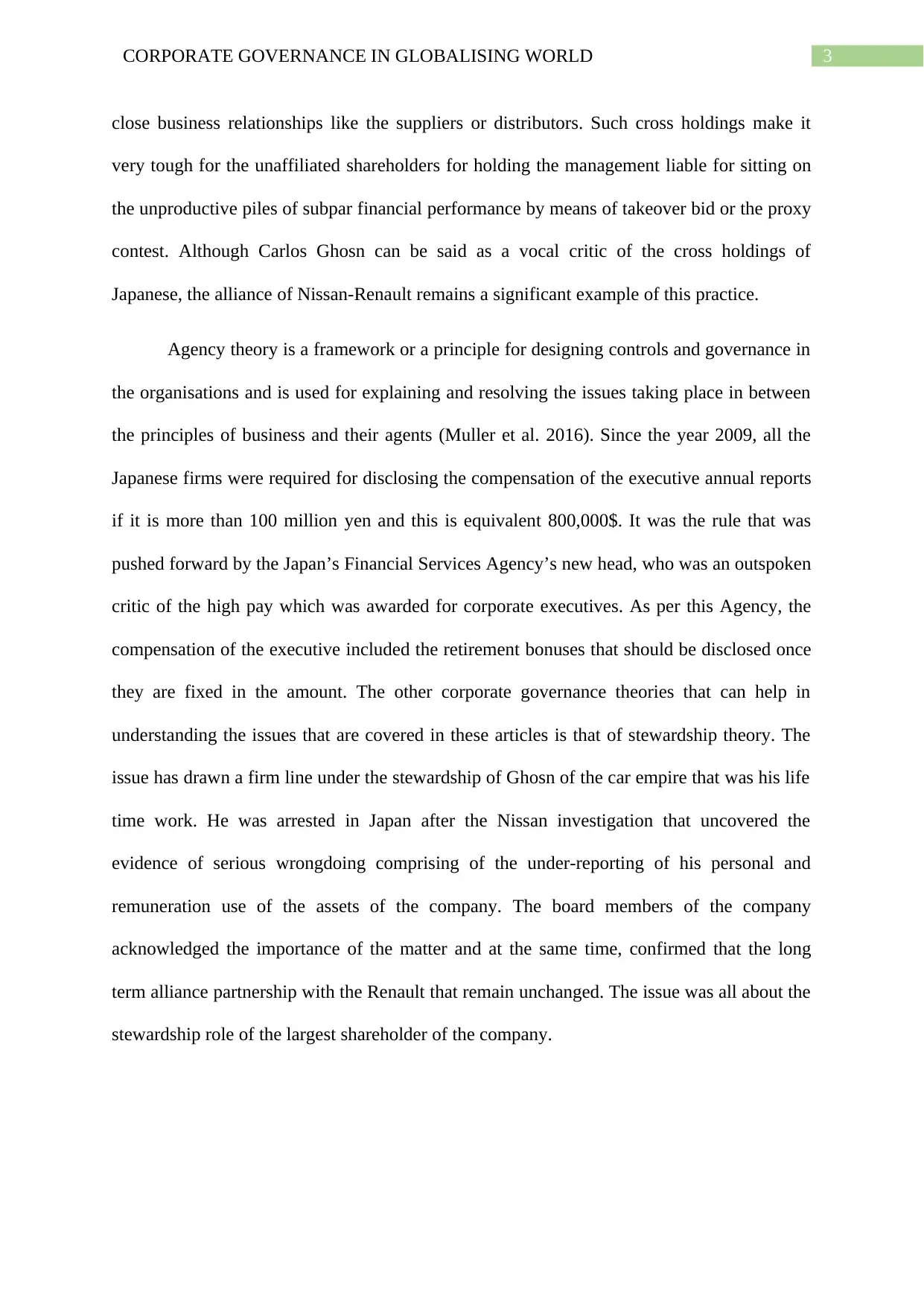
3CORPORATE GOVERNANCE IN GLOBALISING WORLD
close business relationships like the suppliers or distributors. Such cross holdings make it
very tough for the unaffiliated shareholders for holding the management liable for sitting on
the unproductive piles of subpar financial performance by means of takeover bid or the proxy
contest. Although Carlos Ghosn can be said as a vocal critic of the cross holdings of
Japanese, the alliance of Nissan-Renault remains a significant example of this practice.
Agency theory is a framework or a principle for designing controls and governance in
the organisations and is used for explaining and resolving the issues taking place in between
the principles of business and their agents (Muller et al. 2016). Since the year 2009, all the
Japanese firms were required for disclosing the compensation of the executive annual reports
if it is more than 100 million yen and this is equivalent 800,000$. It was the rule that was
pushed forward by the Japan’s Financial Services Agency’s new head, who was an outspoken
critic of the high pay which was awarded for corporate executives. As per this Agency, the
compensation of the executive included the retirement bonuses that should be disclosed once
they are fixed in the amount. The other corporate governance theories that can help in
understanding the issues that are covered in these articles is that of stewardship theory. The
issue has drawn a firm line under the stewardship of Ghosn of the car empire that was his life
time work. He was arrested in Japan after the Nissan investigation that uncovered the
evidence of serious wrongdoing comprising of the under-reporting of his personal and
remuneration use of the assets of the company. The board members of the company
acknowledged the importance of the matter and at the same time, confirmed that the long
term alliance partnership with the Renault that remain unchanged. The issue was all about the
stewardship role of the largest shareholder of the company.
close business relationships like the suppliers or distributors. Such cross holdings make it
very tough for the unaffiliated shareholders for holding the management liable for sitting on
the unproductive piles of subpar financial performance by means of takeover bid or the proxy
contest. Although Carlos Ghosn can be said as a vocal critic of the cross holdings of
Japanese, the alliance of Nissan-Renault remains a significant example of this practice.
Agency theory is a framework or a principle for designing controls and governance in
the organisations and is used for explaining and resolving the issues taking place in between
the principles of business and their agents (Muller et al. 2016). Since the year 2009, all the
Japanese firms were required for disclosing the compensation of the executive annual reports
if it is more than 100 million yen and this is equivalent 800,000$. It was the rule that was
pushed forward by the Japan’s Financial Services Agency’s new head, who was an outspoken
critic of the high pay which was awarded for corporate executives. As per this Agency, the
compensation of the executive included the retirement bonuses that should be disclosed once
they are fixed in the amount. The other corporate governance theories that can help in
understanding the issues that are covered in these articles is that of stewardship theory. The
issue has drawn a firm line under the stewardship of Ghosn of the car empire that was his life
time work. He was arrested in Japan after the Nissan investigation that uncovered the
evidence of serious wrongdoing comprising of the under-reporting of his personal and
remuneration use of the assets of the company. The board members of the company
acknowledged the importance of the matter and at the same time, confirmed that the long
term alliance partnership with the Renault that remain unchanged. The issue was all about the
stewardship role of the largest shareholder of the company.
Paraphrase This Document
Need a fresh take? Get an instant paraphrase of this document with our AI Paraphraser
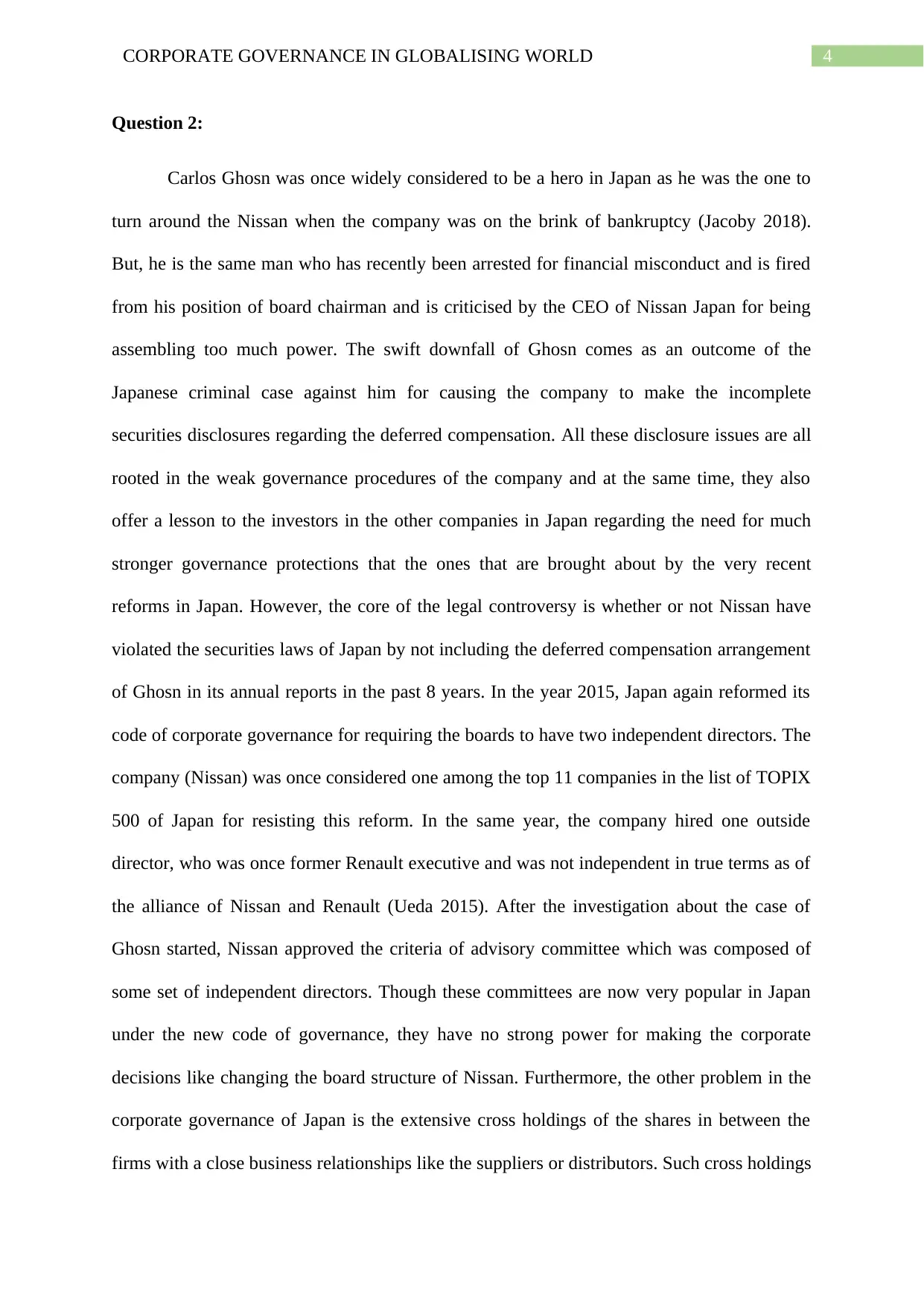
4CORPORATE GOVERNANCE IN GLOBALISING WORLD
Question 2:
Carlos Ghosn was once widely considered to be a hero in Japan as he was the one to
turn around the Nissan when the company was on the brink of bankruptcy (Jacoby 2018).
But, he is the same man who has recently been arrested for financial misconduct and is fired
from his position of board chairman and is criticised by the CEO of Nissan Japan for being
assembling too much power. The swift downfall of Ghosn comes as an outcome of the
Japanese criminal case against him for causing the company to make the incomplete
securities disclosures regarding the deferred compensation. All these disclosure issues are all
rooted in the weak governance procedures of the company and at the same time, they also
offer a lesson to the investors in the other companies in Japan regarding the need for much
stronger governance protections that the ones that are brought about by the very recent
reforms in Japan. However, the core of the legal controversy is whether or not Nissan have
violated the securities laws of Japan by not including the deferred compensation arrangement
of Ghosn in its annual reports in the past 8 years. In the year 2015, Japan again reformed its
code of corporate governance for requiring the boards to have two independent directors. The
company (Nissan) was once considered one among the top 11 companies in the list of TOPIX
500 of Japan for resisting this reform. In the same year, the company hired one outside
director, who was once former Renault executive and was not independent in true terms as of
the alliance of Nissan and Renault (Ueda 2015). After the investigation about the case of
Ghosn started, Nissan approved the criteria of advisory committee which was composed of
some set of independent directors. Though these committees are now very popular in Japan
under the new code of governance, they have no strong power for making the corporate
decisions like changing the board structure of Nissan. Furthermore, the other problem in the
corporate governance of Japan is the extensive cross holdings of the shares in between the
firms with a close business relationships like the suppliers or distributors. Such cross holdings
Question 2:
Carlos Ghosn was once widely considered to be a hero in Japan as he was the one to
turn around the Nissan when the company was on the brink of bankruptcy (Jacoby 2018).
But, he is the same man who has recently been arrested for financial misconduct and is fired
from his position of board chairman and is criticised by the CEO of Nissan Japan for being
assembling too much power. The swift downfall of Ghosn comes as an outcome of the
Japanese criminal case against him for causing the company to make the incomplete
securities disclosures regarding the deferred compensation. All these disclosure issues are all
rooted in the weak governance procedures of the company and at the same time, they also
offer a lesson to the investors in the other companies in Japan regarding the need for much
stronger governance protections that the ones that are brought about by the very recent
reforms in Japan. However, the core of the legal controversy is whether or not Nissan have
violated the securities laws of Japan by not including the deferred compensation arrangement
of Ghosn in its annual reports in the past 8 years. In the year 2015, Japan again reformed its
code of corporate governance for requiring the boards to have two independent directors. The
company (Nissan) was once considered one among the top 11 companies in the list of TOPIX
500 of Japan for resisting this reform. In the same year, the company hired one outside
director, who was once former Renault executive and was not independent in true terms as of
the alliance of Nissan and Renault (Ueda 2015). After the investigation about the case of
Ghosn started, Nissan approved the criteria of advisory committee which was composed of
some set of independent directors. Though these committees are now very popular in Japan
under the new code of governance, they have no strong power for making the corporate
decisions like changing the board structure of Nissan. Furthermore, the other problem in the
corporate governance of Japan is the extensive cross holdings of the shares in between the
firms with a close business relationships like the suppliers or distributors. Such cross holdings
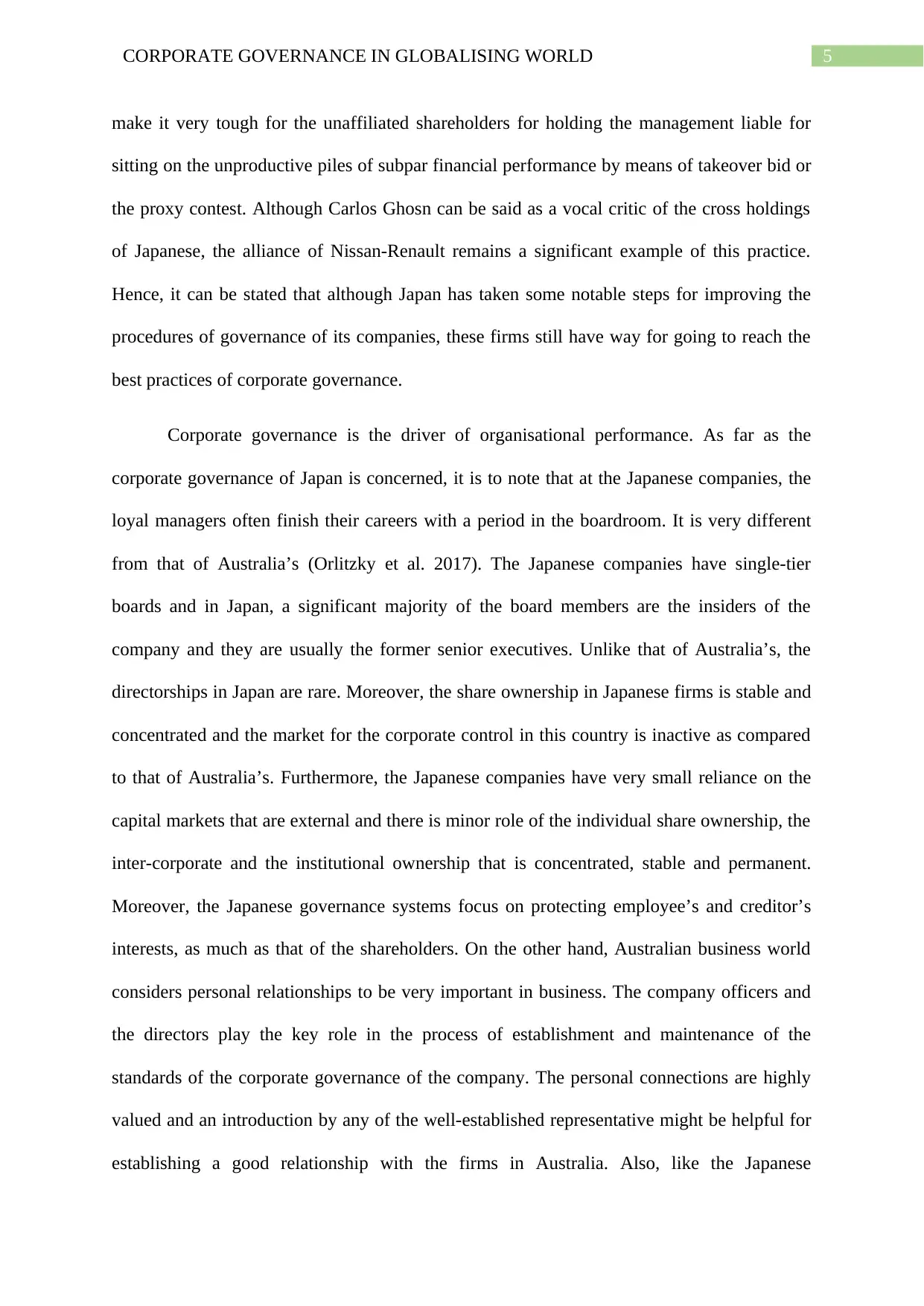
5CORPORATE GOVERNANCE IN GLOBALISING WORLD
make it very tough for the unaffiliated shareholders for holding the management liable for
sitting on the unproductive piles of subpar financial performance by means of takeover bid or
the proxy contest. Although Carlos Ghosn can be said as a vocal critic of the cross holdings
of Japanese, the alliance of Nissan-Renault remains a significant example of this practice.
Hence, it can be stated that although Japan has taken some notable steps for improving the
procedures of governance of its companies, these firms still have way for going to reach the
best practices of corporate governance.
Corporate governance is the driver of organisational performance. As far as the
corporate governance of Japan is concerned, it is to note that at the Japanese companies, the
loyal managers often finish their careers with a period in the boardroom. It is very different
from that of Australia’s (Orlitzky et al. 2017). The Japanese companies have single-tier
boards and in Japan, a significant majority of the board members are the insiders of the
company and they are usually the former senior executives. Unlike that of Australia’s, the
directorships in Japan are rare. Moreover, the share ownership in Japanese firms is stable and
concentrated and the market for the corporate control in this country is inactive as compared
to that of Australia’s. Furthermore, the Japanese companies have very small reliance on the
capital markets that are external and there is minor role of the individual share ownership, the
inter-corporate and the institutional ownership that is concentrated, stable and permanent.
Moreover, the Japanese governance systems focus on protecting employee’s and creditor’s
interests, as much as that of the shareholders. On the other hand, Australian business world
considers personal relationships to be very important in business. The company officers and
the directors play the key role in the process of establishment and maintenance of the
standards of the corporate governance of the company. The personal connections are highly
valued and an introduction by any of the well-established representative might be helpful for
establishing a good relationship with the firms in Australia. Also, like the Japanese
make it very tough for the unaffiliated shareholders for holding the management liable for
sitting on the unproductive piles of subpar financial performance by means of takeover bid or
the proxy contest. Although Carlos Ghosn can be said as a vocal critic of the cross holdings
of Japanese, the alliance of Nissan-Renault remains a significant example of this practice.
Hence, it can be stated that although Japan has taken some notable steps for improving the
procedures of governance of its companies, these firms still have way for going to reach the
best practices of corporate governance.
Corporate governance is the driver of organisational performance. As far as the
corporate governance of Japan is concerned, it is to note that at the Japanese companies, the
loyal managers often finish their careers with a period in the boardroom. It is very different
from that of Australia’s (Orlitzky et al. 2017). The Japanese companies have single-tier
boards and in Japan, a significant majority of the board members are the insiders of the
company and they are usually the former senior executives. Unlike that of Australia’s, the
directorships in Japan are rare. Moreover, the share ownership in Japanese firms is stable and
concentrated and the market for the corporate control in this country is inactive as compared
to that of Australia’s. Furthermore, the Japanese companies have very small reliance on the
capital markets that are external and there is minor role of the individual share ownership, the
inter-corporate and the institutional ownership that is concentrated, stable and permanent.
Moreover, the Japanese governance systems focus on protecting employee’s and creditor’s
interests, as much as that of the shareholders. On the other hand, Australian business world
considers personal relationships to be very important in business. The company officers and
the directors play the key role in the process of establishment and maintenance of the
standards of the corporate governance of the company. The personal connections are highly
valued and an introduction by any of the well-established representative might be helpful for
establishing a good relationship with the firms in Australia. Also, like the Japanese
⊘ This is a preview!⊘
Do you want full access?
Subscribe today to unlock all pages.

Trusted by 1+ million students worldwide
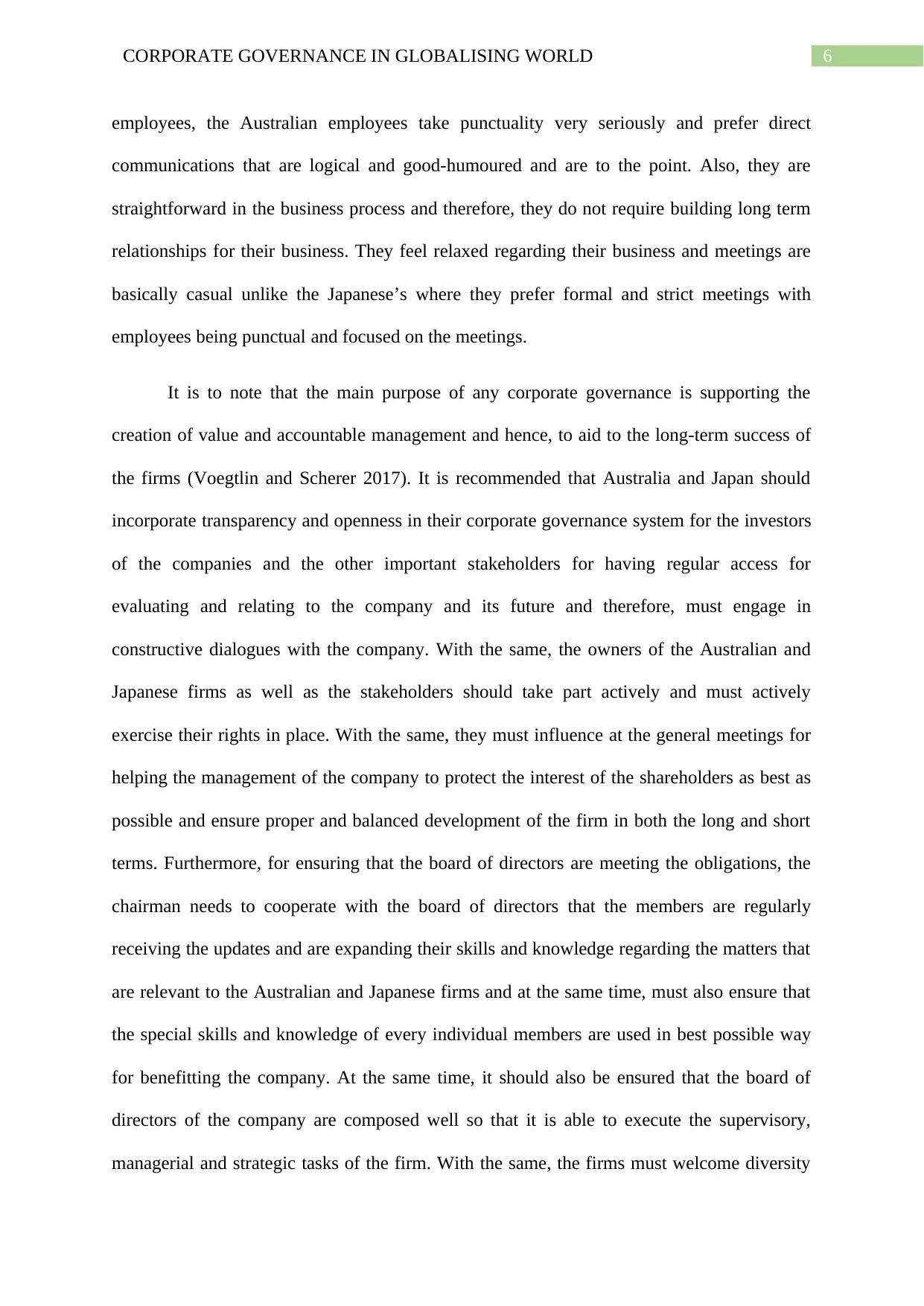
6CORPORATE GOVERNANCE IN GLOBALISING WORLD
employees, the Australian employees take punctuality very seriously and prefer direct
communications that are logical and good-humoured and are to the point. Also, they are
straightforward in the business process and therefore, they do not require building long term
relationships for their business. They feel relaxed regarding their business and meetings are
basically casual unlike the Japanese’s where they prefer formal and strict meetings with
employees being punctual and focused on the meetings.
It is to note that the main purpose of any corporate governance is supporting the
creation of value and accountable management and hence, to aid to the long-term success of
the firms (Voegtlin and Scherer 2017). It is recommended that Australia and Japan should
incorporate transparency and openness in their corporate governance system for the investors
of the companies and the other important stakeholders for having regular access for
evaluating and relating to the company and its future and therefore, must engage in
constructive dialogues with the company. With the same, the owners of the Australian and
Japanese firms as well as the stakeholders should take part actively and must actively
exercise their rights in place. With the same, they must influence at the general meetings for
helping the management of the company to protect the interest of the shareholders as best as
possible and ensure proper and balanced development of the firm in both the long and short
terms. Furthermore, for ensuring that the board of directors are meeting the obligations, the
chairman needs to cooperate with the board of directors that the members are regularly
receiving the updates and are expanding their skills and knowledge regarding the matters that
are relevant to the Australian and Japanese firms and at the same time, must also ensure that
the special skills and knowledge of every individual members are used in best possible way
for benefitting the company. At the same time, it should also be ensured that the board of
directors of the company are composed well so that it is able to execute the supervisory,
managerial and strategic tasks of the firm. With the same, the firms must welcome diversity
employees, the Australian employees take punctuality very seriously and prefer direct
communications that are logical and good-humoured and are to the point. Also, they are
straightforward in the business process and therefore, they do not require building long term
relationships for their business. They feel relaxed regarding their business and meetings are
basically casual unlike the Japanese’s where they prefer formal and strict meetings with
employees being punctual and focused on the meetings.
It is to note that the main purpose of any corporate governance is supporting the
creation of value and accountable management and hence, to aid to the long-term success of
the firms (Voegtlin and Scherer 2017). It is recommended that Australia and Japan should
incorporate transparency and openness in their corporate governance system for the investors
of the companies and the other important stakeholders for having regular access for
evaluating and relating to the company and its future and therefore, must engage in
constructive dialogues with the company. With the same, the owners of the Australian and
Japanese firms as well as the stakeholders should take part actively and must actively
exercise their rights in place. With the same, they must influence at the general meetings for
helping the management of the company to protect the interest of the shareholders as best as
possible and ensure proper and balanced development of the firm in both the long and short
terms. Furthermore, for ensuring that the board of directors are meeting the obligations, the
chairman needs to cooperate with the board of directors that the members are regularly
receiving the updates and are expanding their skills and knowledge regarding the matters that
are relevant to the Australian and Japanese firms and at the same time, must also ensure that
the special skills and knowledge of every individual members are used in best possible way
for benefitting the company. At the same time, it should also be ensured that the board of
directors of the company are composed well so that it is able to execute the supervisory,
managerial and strategic tasks of the firm. With the same, the firms must welcome diversity
Paraphrase This Document
Need a fresh take? Get an instant paraphrase of this document with our AI Paraphraser
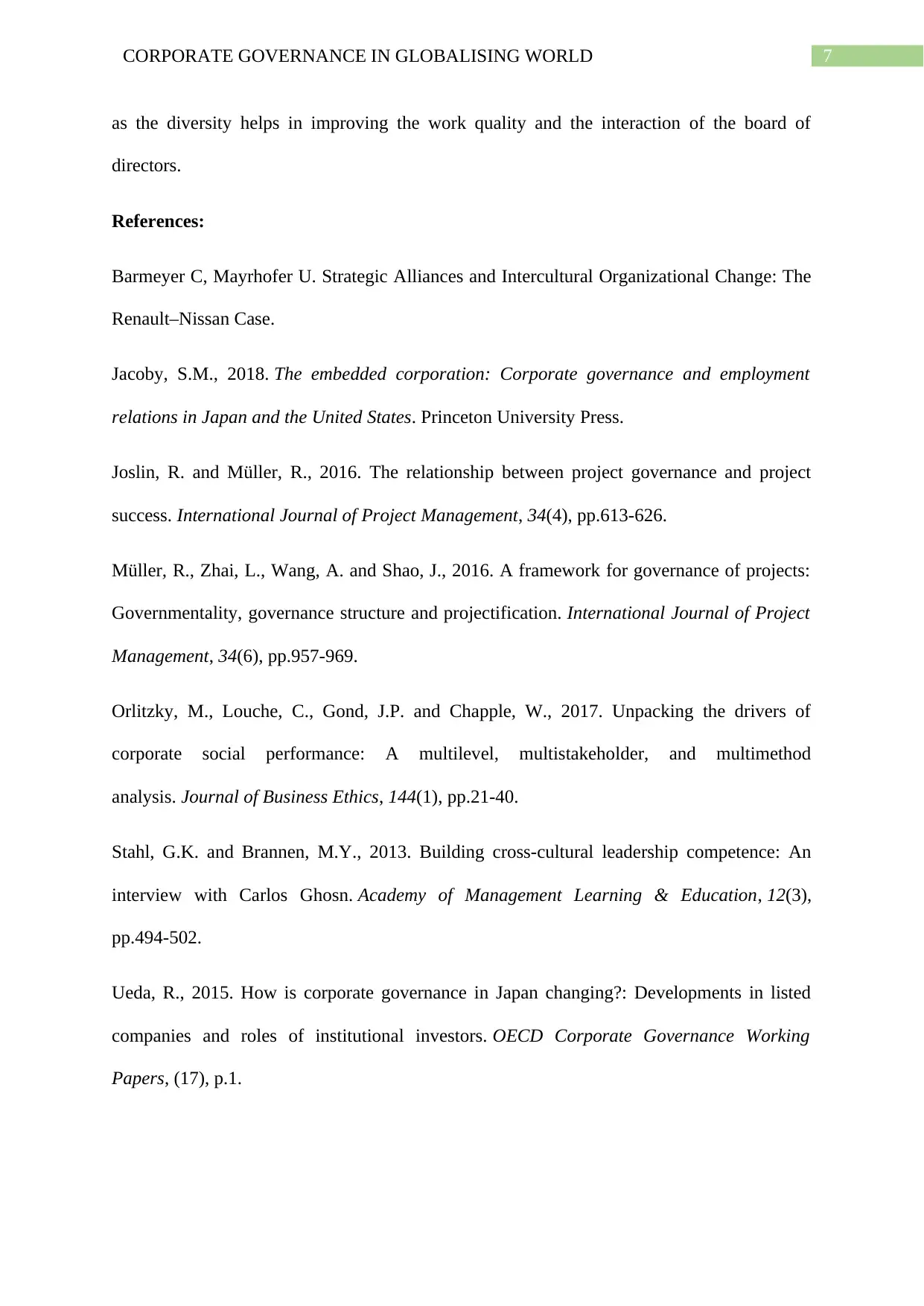
7CORPORATE GOVERNANCE IN GLOBALISING WORLD
as the diversity helps in improving the work quality and the interaction of the board of
directors.
References:
Barmeyer C, Mayrhofer U. Strategic Alliances and Intercultural Organizational Change: The
Renault–Nissan Case.
Jacoby, S.M., 2018. The embedded corporation: Corporate governance and employment
relations in Japan and the United States. Princeton University Press.
Joslin, R. and Müller, R., 2016. The relationship between project governance and project
success. International Journal of Project Management, 34(4), pp.613-626.
Müller, R., Zhai, L., Wang, A. and Shao, J., 2016. A framework for governance of projects:
Governmentality, governance structure and projectification. International Journal of Project
Management, 34(6), pp.957-969.
Orlitzky, M., Louche, C., Gond, J.P. and Chapple, W., 2017. Unpacking the drivers of
corporate social performance: A multilevel, multistakeholder, and multimethod
analysis. Journal of Business Ethics, 144(1), pp.21-40.
Stahl, G.K. and Brannen, M.Y., 2013. Building cross-cultural leadership competence: An
interview with Carlos Ghosn. Academy of Management Learning & Education, 12(3),
pp.494-502.
Ueda, R., 2015. How is corporate governance in Japan changing?: Developments in listed
companies and roles of institutional investors. OECD Corporate Governance Working
Papers, (17), p.1.
as the diversity helps in improving the work quality and the interaction of the board of
directors.
References:
Barmeyer C, Mayrhofer U. Strategic Alliances and Intercultural Organizational Change: The
Renault–Nissan Case.
Jacoby, S.M., 2018. The embedded corporation: Corporate governance and employment
relations in Japan and the United States. Princeton University Press.
Joslin, R. and Müller, R., 2016. The relationship between project governance and project
success. International Journal of Project Management, 34(4), pp.613-626.
Müller, R., Zhai, L., Wang, A. and Shao, J., 2016. A framework for governance of projects:
Governmentality, governance structure and projectification. International Journal of Project
Management, 34(6), pp.957-969.
Orlitzky, M., Louche, C., Gond, J.P. and Chapple, W., 2017. Unpacking the drivers of
corporate social performance: A multilevel, multistakeholder, and multimethod
analysis. Journal of Business Ethics, 144(1), pp.21-40.
Stahl, G.K. and Brannen, M.Y., 2013. Building cross-cultural leadership competence: An
interview with Carlos Ghosn. Academy of Management Learning & Education, 12(3),
pp.494-502.
Ueda, R., 2015. How is corporate governance in Japan changing?: Developments in listed
companies and roles of institutional investors. OECD Corporate Governance Working
Papers, (17), p.1.
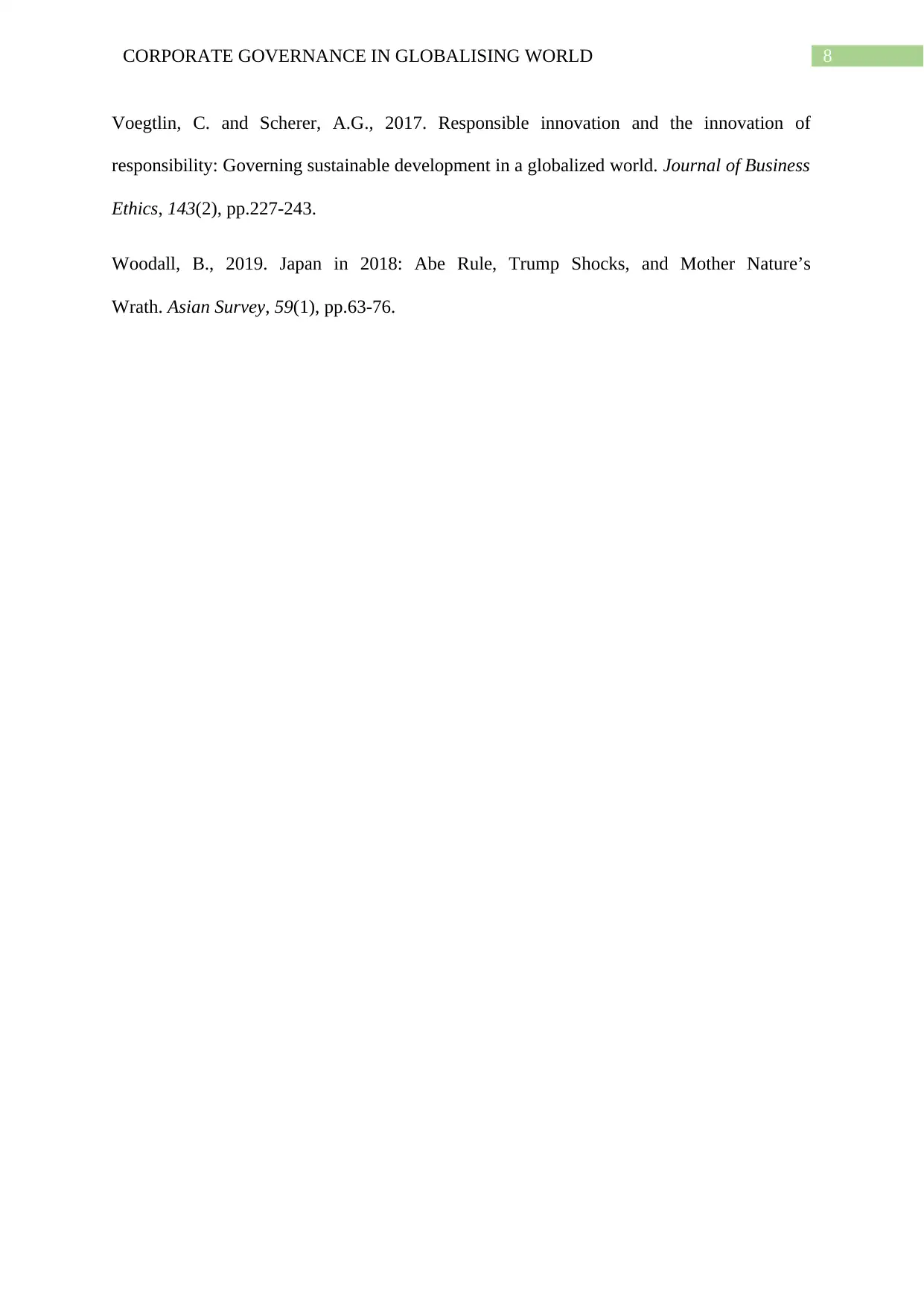
8CORPORATE GOVERNANCE IN GLOBALISING WORLD
Voegtlin, C. and Scherer, A.G., 2017. Responsible innovation and the innovation of
responsibility: Governing sustainable development in a globalized world. Journal of Business
Ethics, 143(2), pp.227-243.
Woodall, B., 2019. Japan in 2018: Abe Rule, Trump Shocks, and Mother Nature’s
Wrath. Asian Survey, 59(1), pp.63-76.
Voegtlin, C. and Scherer, A.G., 2017. Responsible innovation and the innovation of
responsibility: Governing sustainable development in a globalized world. Journal of Business
Ethics, 143(2), pp.227-243.
Woodall, B., 2019. Japan in 2018: Abe Rule, Trump Shocks, and Mother Nature’s
Wrath. Asian Survey, 59(1), pp.63-76.
⊘ This is a preview!⊘
Do you want full access?
Subscribe today to unlock all pages.

Trusted by 1+ million students worldwide
1 out of 9
Related Documents
Your All-in-One AI-Powered Toolkit for Academic Success.
+13062052269
info@desklib.com
Available 24*7 on WhatsApp / Email
![[object Object]](/_next/static/media/star-bottom.7253800d.svg)
Unlock your academic potential
Copyright © 2020–2026 A2Z Services. All Rights Reserved. Developed and managed by ZUCOL.




